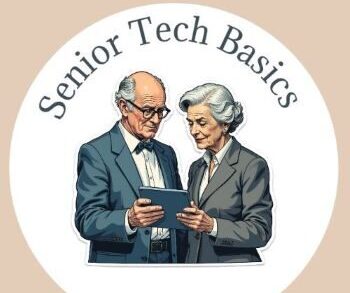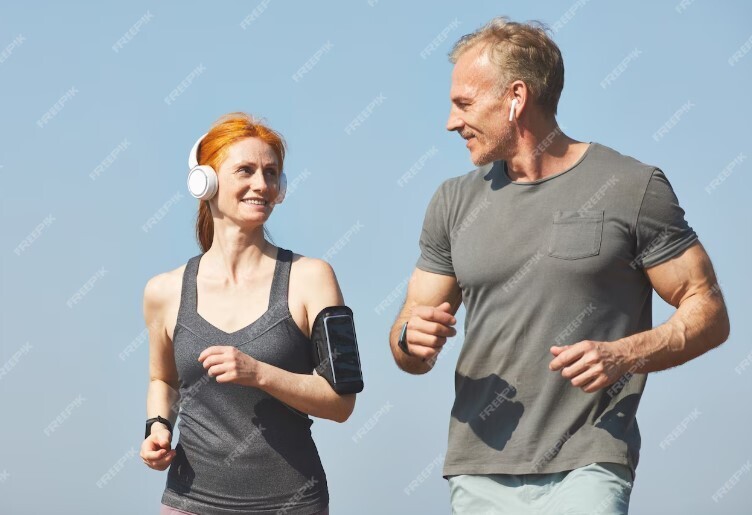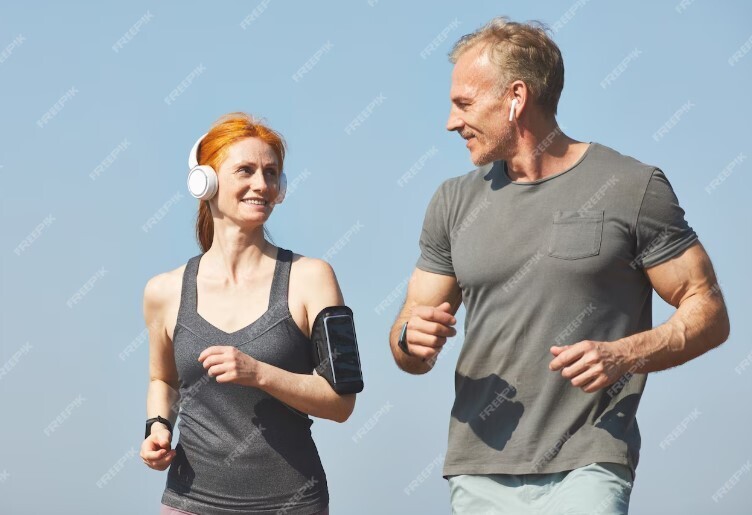
Fitness trackers may seem too technical or unnecessary at first for many seniors. Still, today’s models are simple, affordable, and surprisingly helpful to monitor your heart rate, sleep patterns, daily activity, and even safety, all from the convenience of your wrist.
We will examine the top benefits of fitness trackers for older adults, how they work, what they track, and why using these gadgets can help to improve your physical and mental well-being.
Encourages Daily Movement and Exercise.
Fitness trackers can help older adults who want to stay active but struggle with motivation to move feel more motivated and rewarded by achieving their goals.
These devices help to improve regular movement, support heart health, balance, and joint mobility, which can improve your overall health as you age.
Key benefits:
- Tracks steps, distance walked, and active minutes.
- Sends gentle reminders to move and avoid prolonged sitting.
- Celebrates small wins, like reaching a daily goal.
Monitors Heart Health in Real Time.
Fitness trackers with heart rate sensors offer a convenient way to monitor your heart rate without needing to visit a doctor.
Daily tracking typically helps individuals with high blood pressure, heart disease, or arrhythmia gain peace of mind.
Key benefits:
- Continuous heart rate monitoring.
- Some models offer alerts for unusually high or low heart rates.
- Advanced devices such as Fitbit or Apple Watch can detect AFib or provide ECG readings.
For example, the Fitbit Charge 6 and the Apple Watch SE both support exporting heart data for doctor visits.
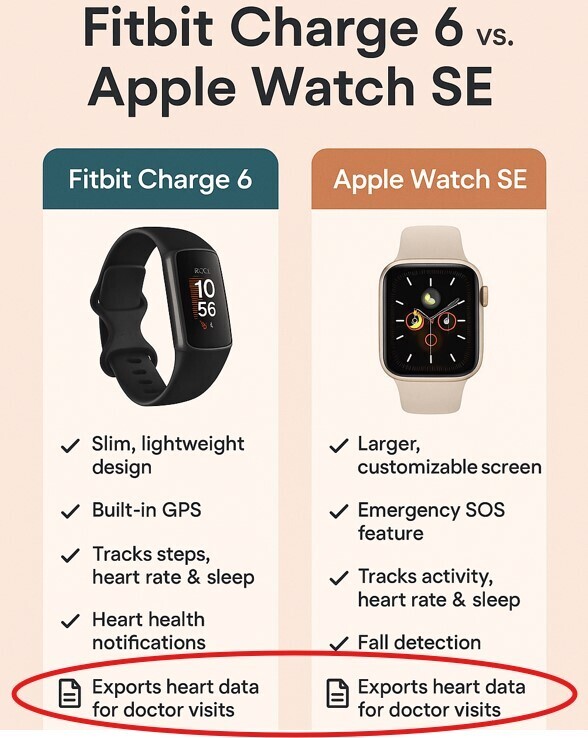
Tracks Sleep Quality for Better Rest.
Many older adults experience poor sleep, which often goes unnoticed, while fitness trackers can help you become aware of your nighttime habits.
Better sleep supports memory, mood, and physical health, especially in older age. Choose a lightweight tracker with a soft strap for overnight comfort.
Key benefits:
- Tracks total sleep, time awake, and time in deep vs. light sleep.
- Helps identify patterns, like waking up frequently or sleeping too little.
- Some devices offer gentle vibration alarms to avoid loud, jarring sounds.
Related Content: Seven Best Medication and Appointment Reminder Apps for Seniors.
Increases Awareness of Health Habits.
Fitness trackers can also make your health more visible by tracking your movement, sleep, or rest. They can even sync with health apps like Apple Health or Google Fit for easier viewing and sharing with doctors.
Key benefits:
- View trends in steps, heart rate, and sleep over the course of days or weeks.
- Spot changes that might signal a health issue (e.g., reduced activity or poor sleep).
- Helps family members or caregivers track wellness (when connected to an app).
Supports Mental Well-being and Routine.
Many often overlook the fact that staying active and connected to your health can also have mental and emotional benefits.
A structured, active day helps improve mind and body, especially during retirement or after life changes.
Key benefits:
- Light exercise (like daily walking) improves mood and reduces anxiety.
- Many trackers include guided breathing or relaxation reminders.
- Achieving daily goals helps build confidence and fosters a healthy routine.
💬 “I love seeing my steps at the end of the day, which makes me feel proud.” — Margaret, age 72.
Promotes Safety Features in Select Models.
Some fitness trackers include additional safety features that extend beyond health tracking, making them ideal for older adults who live alone or are concerned about falls.
For example, the Apple Watch SE features fall detection and SOS, providing peace of mind for seniors and their families.
Key benefits:
- Fall detection automatically alerts emergency contacts.
- Some models, such as the Apple Watch, have emergency SOS buttons.
- GPS tracking for safe walking or outdoor exercise.
- And more.
Helps with Doctor Appointments.
Fitness trackers don’t replace medical advice, but they can support more informed conversations with your healthcare provider.
Your doctor gets a clearer picture of your day-to-day health, especially if you live with conditions like high blood pressure, diabetes, or heart disease.
Key benefits:
- Track patterns in sleep, heart rate, and activity over time.
- Some apps generate downloadable health reports.
- Helps recall health changes without relying solely on memory.
You can learn more about how to use health data during doctor visits from the National Institute on Aging.
Easy to Use with Senior-Friendly Options.
Many fitness trackers are comfortable and straightforward to use, even if you don’t use a smartphone. You don’t need to be tech-savvy to enjoy the benefits.
Look for devices with the following key features:
- Large, easy-to-read screens.
- One-touch operation or voice commands.
- Long battery life (5+ days).
- Minimal setup or sync requirements.
Affordable and Widely Available.
Fitness trackers come in a wide range of prices, from under $50 for basic models, enabling many to access them without breaking the bank. Additionally, many insurers or senior programs offer discounts or subsidies on devices.
Options include:
- Basic step counters and pedometers.
- Budget-friendly smart bands with heart rate monitors.
- Premium models with more advanced health features.
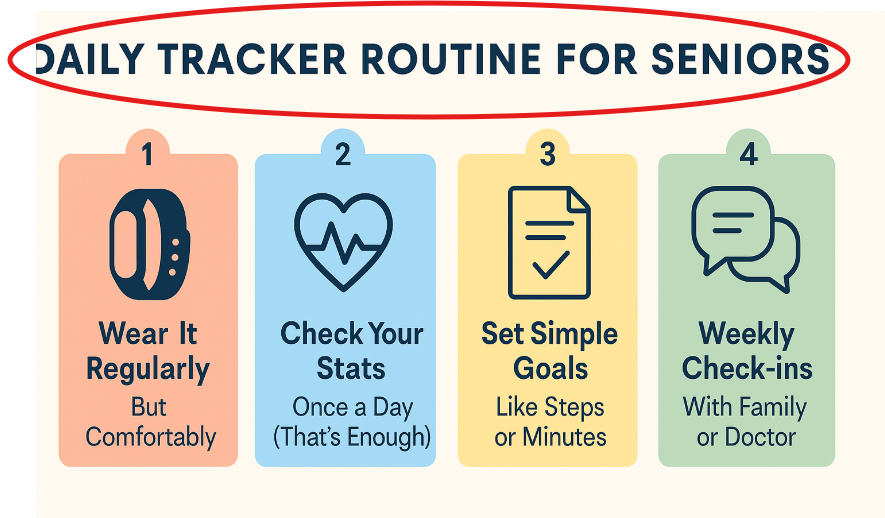
Frequently Asked Questions.
Are fitness trackers easy for seniors to use?
Yes, many fitness trackers are simple to use. Select models with large screens, one-button operation, minimal setup, and that don’t require a smartphone, such as the WellBe Smartwatch or Amazfit Band 7.
Do you need a smartphone to use a fitness tracker?
Many trackers sync with apps to provide added features, functioning as standalone step counters that display key data (steps, heart rate, and time) right on the screen, and require one setup to use without daily phone interaction.
Can a fitness tracker detect health problems?
Fitness trackers can alert you to early signs of issues such as irregular heart rate, poor sleep quality, and low physical activity.
Some models even support ECG readings or fall detection, allowing users to share this information with a healthcare provider. Still, they can’t replace medical diagnosis.
What is the best fitness tracker for seniors?
The best fitness trackers seniors can choose include the Fitbit Charge 6 for heart rate tracking and sleep monitoring, the Apple Watch SE, which provides features, and the WellBe Emergency Alert Watch for seniors.
Our guide to the Best Fitness Trackers for Seniors compares top models to help you select the one that’s right for you.
How much do fitness trackers for seniors cost?
Fitness trackers range in price depending on their features. Basic models for step counting and heart rate cost $30–$60. Mid-range trackers for sleep, stress, and app sync cost $60–$120. The price of advanced smartwatches for fall detection, ECG, and GPS ranges from $150 to over $300.
Some insurance providers and senior wellness programs offer discounts or reimbursements for fitness devices; check with your plan or a local community health center for details.
Final Thoughts.
Fitness trackers help older adults stay active, informed, and independent by tracking heart health, sleep, promoting daily movement, and ensuring safety to support healthy aging in practice without being tech-savvy.
Choose an easy-to-use and comfortable device to help establish a wellness routine or closely monitor an existing health condition, making a real difference in your daily life.
